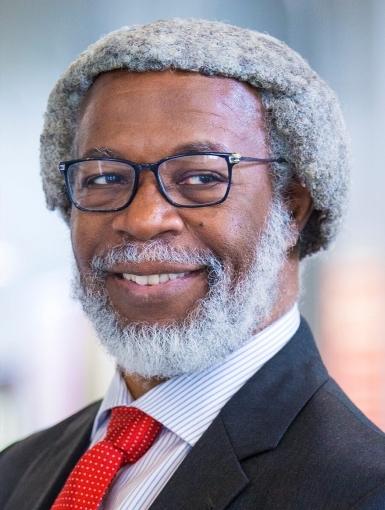
Last month, Distinguished University Professor Jim Gates was granted an honorary Ph.D. from Wits University in Johannesburg, South Africa. A renowned physicist and mathematician, Gates has garnered global accolades for his pioneering work spanning an extraordinary four decades. His revolutionary contributions in supersymmetry, supergravity and superstring theory have furthered the frontiers of scientific exploration, and his advocacy for the advancement of science and technology among African communities has been instrumental in expanding the global science education landscape.
Gates draws inspiration from an early mentor, theoretical physicist and Nobel Prize Laureate Abdus Salam. Spending five consecutive summers as a young scientist under Salam’s mentorship left a lasting impact on Gates’ career.
“One of the people who mentored me early in my career was physicist, Nobelist and founder of the International Centre for Theoretical Physics, Dr. Abdus Salam, who first started me thinking about the very subtle interaction and effects that culture has on STEM disciplines and fields,” reflects Gates.
Salam’s goal was simple yet powerful: he wanted Gates to see people from an array of diverse backgrounds excelling in the highest echelons of mathematical physics to demonstrate that racial barriers should not hinder progress. “His comments inspired me to enter a lifelong contemplation on how the lack of diversity in scientific research and education likely has a crippling impact on innovation in these fields.”
Throughout his remarkable career, Gates has not only contributed groundbreaking research but has also mentored numerous Ph.D. students and garnered recognition from prestigious institutions worldwide. His extensive publication record and exceptional leadership have solidified his legacy as a trailblazer in scientific engagement.
The simplest analogy I can give is to imagine how limited the world of music would be without the rich diverse demographics of its contributors.Jim Gates
Sharing his perspective on the future of scientific research and education, Gates acknowledges, "The simplest analogy I can give is to imagine how limited the world of music would be without the rich diverse demographics of its contributors."
Referencing his honorary Ph.D. from Wits, Gates observes, “It comes to me at a time when here in the USA, we have seen a closing of the doors of opportunity via a ruling from the highest court in our land. The net result will likely be the continuing incarceration of the better possibilities of the future within the worst practices of a dark past.”
In a world focused on the future of scientific exploration and discovery, Gates recognizes the vital role that diverse perspectives play in fostering innovation and advancing research and education. By embracing these diverse perspectives, we may unlock solutions that transcend the boundaries of conventional thinking and drive humanity toward greater progress.
Gates expressed his gratitude for receiving the honorary Ph.D. and highlighted its significance in his lifelong mission. "This, along with other honorifics, have given me a great sense of validation in my personal efforts to open pathways to a brighter future for the multiple possibilities of seeing all of humanity contribute to progress and innovation in STEM fields and the welfare of the species.”




